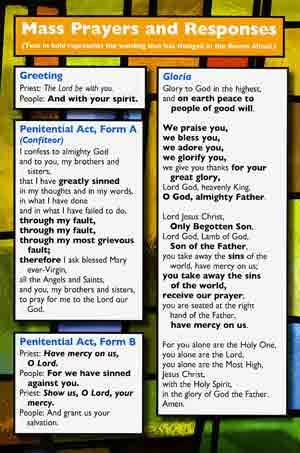 This is the updated language in the third edition of the Roman Missal, from a pew card published by Our Sunday Visitor. The new English version of the Roman Missal will be implemented in the U.S. on the first Sunday of Advent, Nov. 27. (CNS photo)
This is the updated language in the third edition of the Roman Missal, from a pew card published by Our Sunday Visitor. The new English version of the Roman Missal will be implemented in the U.S. on the first Sunday of Advent, Nov. 27. (CNS photo)
WHEN and WHY?
Churches throughout the Archdiocese of Milwaukee will use the new Roman Missal Nov. 27, the first Sunday of Advent. According to a Catholic News Service article published Sept. 1, liturgists agree that the most recent changes “more closely reflect ‘Liturgiam Authenticam’ (‘The Authentic Liturgy’), the Congregation for Divine Worship and the Sacraments’ 2001 document on liturgical translations,” but are “unlikely to be the last.”
WHAT?
Beginning with the priest’s greeting and continuing through the Mass, a couple dozen words will change in the new Roman Missal, according to CNS.
Key phrases that will change : When the priest says, “The Lord be with you,” you will reply, “And with your spirit.” Not, “And also with you.”
During the penitential rite, “that I have greatly sinned.” Not “that I have sinned through my own fault.”; and “Through my fault, through my fault, through my most grievous fault.” Not “in what I have failed to do.”
The Gloria text will say, “Glory to God in the highest and on earth peace to people of good will.” Not, “Glory to God in the highest and peace to his people on earth.”
In four places in the Nicene Creed, we will say, “I believe.” Not “We believe.” And “all things visible and invisible.” Not “all that is seen and unseen.” And, “the only begotten son of God, born of the Father before all ages.” Not “the only Son of God, eternally begotten of the Father.” And becoming “consubstantial with the Father.” Not “one in being with the Father.” Another change: “And by the Holy Spirit was incarnate of the Virgin Mary.” Not “by the power of the Holy Spirit he was born of the Virgin Mary.” And “is adored and glorified.” Not “he is worshiped and glorified.” And “confess,” not “acknowledge,” one baptism and “look forward to,” not “look for” the resurrection of the dead.”
The Apostles’ Creed: Will delete the second use of “I believe in,” and say “he descended into hell,” not “he descended to the dead.” “And is seated at the right hand of God the Father almighty; from there he will come to judge the living and the dead.”
We will say, “Holy, holy, holy, Lord, God of Hosts.” Not, “Holy, holy, holy, Lord, God of power and might.”
“Christ has died, Christ is risen, Christ will come again” and “Dying you destroyed our death, rising you restored our life. Lord Jesus, come in glory,” won’t be used anymore.
“We proclaim your death, O Lord, and profess your resurrection until you come again,” is a new acclamation.
“When we eat this bread and drink this cup, we proclaim your death, O Lord, until you come again,” and “Save us, Savior of the world, for by your cross and resurrection you have set us free” have been adapted from previously used acclamations.
The priest will say, “Behold, the Lamb of God, behold him who takes way the sins of the world. Blessed are those called to the supper of the Lamb,” and we will reply, “Lord, I am not worthy that you should enter under my roof, but only say the word and my soul shall be healed.” Not “This is the Lamb of God who takes away the sins of the world. Happy are those who are called to his supper,” and “Lord I am not worthy to receive you, but only say the word and I shall be healed.”
